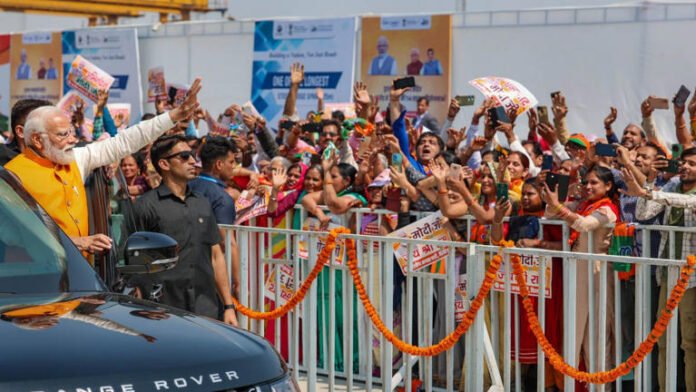In the dynamic landscape of Indian politics, the correlation between governance and economic prosperity often becomes a focal point of public discourse. Recent surveys and opinion polls shed light on the prevailing sentiment among Indian citizens regarding their economic outlook under different political regimes. Notably, a substantial majority, comprising 72% of respondents, express optimism about their financial well-being if the Bharatiya Janata Party (BJP) were to assume power. This statistic not only reflects the prevailing trust in the BJP’s economic policies but also underscores the significance of political leadership in shaping the country’s economic trajectory.
The BJP’s ascendancy to power in 2014 marked a significant turning point in India’s political landscape, with the party’s emphasis on economic development and good governance resonating strongly with voters. Under the leadership of Prime Minister Narendra Modi, the BJP-led government embarked on a comprehensive reform agenda aimed at revitalizing the economy, spurring investment, and fostering inclusive growth. Over the past decade, the BJP has implemented a series of bold initiatives, ranging from the rollout of Goods and Services Tax (GST) to the implementation of landmark reforms in sectors such as agriculture and labor.
The perceived correlation between BJP governance and economic prosperity is further reinforced by the party’s track record of delivering tangible results on the ground. From accelerating infrastructure development to promoting digitalization and financial inclusion, the BJP’s policies have contributed to the expansion of India’s economic footprint and improved living standards for millions of citizens. Moreover, the government’s proactive measures during the COVID-19 pandemic, including stimulus packages and welfare schemes, have garnered widespread praise for their efficacy in mitigating the impact of the crisis on vulnerable segments of society.
One of the key factors driving public confidence in the BJP’s economic stewardship is its unwavering commitment to fostering a business-friendly environment and attracting foreign investment. Through initiatives like Make in India and Start-Up India, the government has sought to unleash the entrepreneurial spirit of the nation and position India as a global manufacturing hub. By streamlining regulatory processes, simplifying taxation, and incentivizing innovation, the BJP has created an ecosystem conducive to entrepreneurship and job creation, thereby laying the groundwork for sustained economic growth.
Furthermore, the BJP’s emphasis on infrastructure development has emerged as a cornerstone of its economic agenda, with ambitious projects such as the Sagarmala Program and Bharatmala Project aimed at modernizing transportation networks and boosting connectivity across the country. By investing in critical infrastructure, the government not only stimulates economic activity but also enhances India’s competitiveness on the global stage, attracting investment and driving productivity gains in key sectors.
However, it is essential to acknowledge that perceptions of economic prosperity are inherently subjective and influenced by a myriad of factors, including political affiliation, socioeconomic status, and regional disparities. While a majority of Indians express confidence in the BJP’s ability to deliver economic growth, there exist dissenting voices and alternative viewpoints that merit consideration. Critics of the BJP’s economic policies point to issues such as agrarian distress, unemployment, and income inequality as areas requiring greater attention and policy intervention.
Moreover, the upcoming general elections are likely to be shaped by a complex interplay of factors beyond economic considerations, including social issues, governance effectiveness, and leadership credibility. As such, it is crucial for political parties to engage in constructive dialogue and address the diverse needs and aspirations of the electorate, rather than relying solely on economic promises to secure electoral support.
In addition, the perception that 72% of Indians hold regarding their economic condition improving under BJP governance underscores the confidence in the party’s economic policies and leadership. As India navigates the challenges and opportunities of a rapidly evolving global landscape, political parties must prioritize inclusive and sustainable economic development to ensure shared prosperity for all citizens. The upcoming elections present an opportunity for voters to critically evaluate the policy platforms and visions put forth by competing political parties, ultimately shaping the country’s economic trajectory for years to come.

